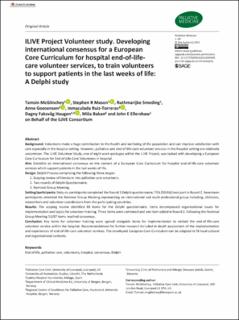| dc.contributor.author | McGlinchey, Tamsin | |
| dc.contributor.author | Mason, Stephen R | |
| dc.contributor.author | Smeding, Ruthmarijke | |
| dc.contributor.author | Goosensen, Anne | |
| dc.contributor.author | Ruiz-Torreras, Inmaculada | |
| dc.contributor.author | Haugen, Dagny Renata Faksvåg | |
| dc.contributor.author | Bakan, Miša | |
| dc.contributor.author | Ellershaw, John E | |
| dc.date.accessioned | 2021-12-15T11:33:11Z | |
| dc.date.available | 2021-12-15T11:33:11Z | |
| dc.date.created | 2021-11-08T10:36:30Z | |
| dc.date.issued | 2021 | |
| dc.identifier.issn | 0269-2163 | |
| dc.identifier.uri | https://hdl.handle.net/11250/2834402 | |
| dc.description.abstract | Background: Volunteers make a huge contribution to the health and wellbeing of the population and can improve satisfaction with care especially in the hospice setting. However, palliative and end-of-life-care volunteer services in the hospital setting are relatively uncommon. The iLIVE Volunteer Study, one of eight work-packages within the iLIVE Project, was tasked with developing a European Core Curriculum for End-of-Life-Care Volunteers in hospital.
Aim: Establish an international consensus on the content of a European Core Curriculum for hospital end-of-life-care volunteer services which support patients in the last weeks of life.
Design: Delphi Process comprising the following three stages:
1. Scoping review of literature into palliative care volunteers.
2. Two rounds of Delphi Questionnaire.
3. Nominal Group Meeting.
Setting/participants: Sixty-six participants completed the Round 1 Delphi questionnaire; 75% (50/66) took part in Round 2. Seventeen participants attended the Nominal Group Meeting representing an international and multi-professional group including, clinicians, researchers and volunteer coordinators from the participating countries.
Results: The scoping review identified 88 items for the Delphi questionnaire. Items encompassed organisational issues for implementation and topics for volunteer training. Three items were combined and one item added in Round 2. Following the Nominal Group Meeting 53/87 items reached consensus.
Conclusion: Key items for volunteer training were agreed alongside items for implementation to embed the end-of-life-care volunteer service within the hospital. Recommendations for further research included in-depth assessment of the implementation and experiences of end-of-life-care volunteer services. The developed European Core Curriculum can be adapted to fit local cultural and organisational contexts. | en_US |
| dc.language.iso | eng | en_US |
| dc.publisher | SAGE | en_US |
| dc.rights | Navngivelse 4.0 Internasjonal | * |
| dc.rights.uri | http://creativecommons.org/licenses/by/4.0/deed.no | * |
| dc.title | ILIVE Project Volunteer study. Developing international consensus for a European Core Curriculum for hospital end-of-life-care volunteer services, to train volunteers to support patients in the last weeks of life: A Delphi study | en_US |
| dc.type | Journal article | en_US |
| dc.type | Peer reviewed | en_US |
| dc.description.version | publishedVersion | en_US |
| dc.rights.holder | Copyright 2021 the authors | en_US |
| cristin.ispublished | true | |
| cristin.fulltext | original | |
| cristin.qualitycode | 1 | |
| dc.identifier.doi | 10.1177/02692163211045305 | |
| dc.identifier.cristin | 1952223 | |
| dc.source.journal | Palliative Medicine | en_US |
| dc.identifier.citation | Palliative Medicine. 2021. | en_US |

